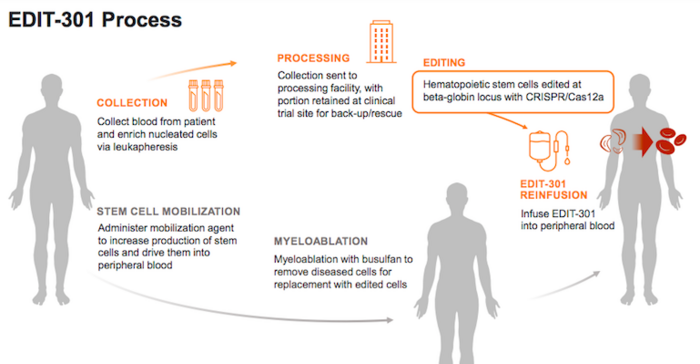CRISPR Therapy for Beta Thalassemia Obtains FDA Rare Paediatric Disease Designation
CMN Intelligence - The World’s Most Comprehensive Intelligence Platform for CRISPR-Genomic Medicine and Gene-Editing Clinical Development
Providing market intelligence, data infrastructure, analytics, and reporting services for the global gene-editing sector. Read more...
Editas Medicine announced yesterday that the FDA has granted Rare Paediatric Disease Designation to EDIT-301 for the treatment of beta thalassemia in children.
EDIT-301 is a CRISPR-edited cell therapy under development for the treatment of transfusion-dependent beta thalassemia (TDT) and sickle cell disease (SCD).
A CRISPR-Cas12a-edited cell therapy designed to reactivate foetal haemoglobin
EDIT-301 is a patient-derived (autologous) CRISPR-Cas12a-edited cell therapy that is designed to compensate for the lack of adult haemoglobin in beta thalassemia through reactivation of foetal haemoglobin (HbF) expression (see Fact Box).
Specifically, EDIT-301 is developed using CRISPR-Cas12a ribonucleoprotein to make edits that enhance the HBG1/2 promoter region in the beta-globin locus of patient-derived blood stem cells. This strategy is envisioned to mimic the hereditary persistence of HbF that is observed in some individuals that produce HbF well into adulthood.
Beta thalassemia and foetal haemoglobin
Beta thalassemia belongs to a group of diseases known as the thalassemias, which are characterised by haemoglobin deficiency. HbF is highly expressed and critical during foetal development, and is then rapidly suppressed early in life. Reactivation of HbF expression has emerged as an attractive strategy to treat the symptoms of beta thalassemia (and the related group of sickle cell diseases).
A number of clinical trials investigating various gene-editing approaches to reactivate HbF are underway, and you can read about a selection of these in an earlier clinical trial update.

In December 2021, Editas announced plans to initiate a Phase 1/2 clinical trial in TDT for EDIT-301 following IND approval by the FDA. We will provide further updates about this trial as they become available.
Several ongoing gene-editing trials for beta thalassemia
Decades of research to unravel how HbF production is regulated has paved the way for new therapeutic strategies for beta thalassemia, many of which are now being evaluated in clinical trials.
CTX001, which is a patient-derived CRISPR-Cas9-edited blood stem cell therapy developed by Vertex Pharmaceuticals, is the most clinically-advanced gene-edited candidate for beta thalassemia. CTX001 cells harbour a small deletion in the BCL11A gene. This gene encodes a potent repressor of HbF expression and its disruption thus leads to reactivation of HbF in the edited cells. CTX001 is being evaluted in the CLIMB-Thal-111 for TDT, and the company shared promising clinical data at the European Hematology Association Annual meeting in June 2021.
Other companies sponsoring clinical trials for gene-editing candidates for beta thalassemia include EdiGene, Sangamo Therapeutics, and BioRay Laboratories. You can read more about these in our recent beta thalassemia gene-editing trial roundup here.
You can find all our previous news articles about gene-editing clinical trials here. For a complete overview of CRISPR IND approvals and ongoing gene-editing trials, check out CRISPR Medicine News' Clinical Trials Database.
To get more of the CRISPR Medicine News delivered to your inbox, sign up to the free weekly CMN Newsletter here.
Tags
ArticleClinical News UpdatesBeta ThalassemiaTransfusion-Dependent Beta Thalassemia, TDTEditas Medicine, Inc.TrialsClinical
CLINICAL TRIALS
Sponsors:
Base Therapeutics (Shanghai) Co., Ltd.
Sponsors:
Base Therapeutics (Shanghai) Co., Ltd.







